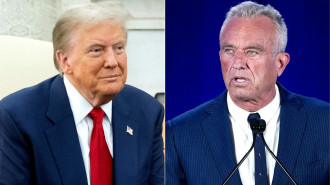Hundreds of thousands of Muslims 'secretly placed' on World-Check 'terrorism' database
The World-Check database, which is used by 49 of the 50 largest banks in the world, contains the names of three million people, and 25,000 names on average are added to it every month. Police forces and intelligence agencies around the world also use it.
The database, which is effectively a blacklist, places individuals in various categories. Some are accused of money laundering and corruption while others are accused of financing terrorism.
Read more: How the War on Terror facilitates repression
The Al-Jazeera documentary, part of the What’s Hidden is Worse series, revealed that thousands of Muslim individuals and institutions had been placed on the World-Check blacklist, among them the trustees of London's Finsbury Park Mosque.
As a result, the mosque's bank account was closed on the grounds that it supported terrorism. After the Finsbury Park trustees took World-Check to court, the company apologised to them and removed the mosque's name from the list.
Farooq Bajwa, a lawyer representing people who had been placed on the terrorism blacklist, told Al-Jazeera that individuals would sometimes be named on the list simply as a result of Google searches.
Bajwa estimated that one million of the three million names on the World-Check list were there because of supposed "terrorist" affiliations, 90 percent of them Muslims.
World-Check would sometimes place people on the terrorism list only because of negative coverage in pro-Israeli and right-wing blogs, according to the Al-Jazeera documentary.
In addition, it would place people and organisations on its list because they were on other terrorism lists published by authoritarian governments in the Middle East, such as those of the UAE and Egypt, without any regard to the nature of these governments and their suppression of domestic opposition.
In July 2015, the HSBC bank accounts of the Cordoba Foundation think tank and its chief executive, Anas Al-Tikriti, were closed after World-Check listed them on its database.
Middle East Eye reported at the time that this was because Cordoba Foundation was listed as a "terrorist organization" by the UAE government. A UAE list released in 2014 also included the global charity Islamic Relief among supposed "terrorist organizations".
World-Check is a private company but being placed on its list could have serious legal implications for individuals. The company's lack of transparency and its seemingly arbitrary classification of individuals raises concerns regarding human and legal rights.
World-Check used to be owned by Thomson Reuters but in 2018, the media conglomerate sold 55 percent of its shares in the company.
Another person who was placed on its list was Egyptian football star Mohamed Abutrika. Following the 2013 coup in Egypt, the Sisi government froze his assets and placed him on its terror list, saying he was a member of the Muslim Brotherhood.
Abutrika denies any affiliation to the organization and World-Check's decision to place him on the list seems to have been based on reports in pro-Sisi Egyptian media.
In 2019, Palestinian-British activist Majed al-Zeer, the director of the UK-based Palestinian Return Centre (PRC), took World-Check to court and won a payout of 10,000 pounds after having his name removed.
The PRC has campaigned extensively for the right of Palestinian refugees to return to their lands and WorldCheck's decision to blacklist al-Zeer was based on an unsubstantiated claim by the Israeli government that he was a member of Hamas.
Follow us on Twitter: @The_NewArab







 Follow the Middle East's top stories in English at The New Arab on Google News
Follow the Middle East's top stories in English at The New Arab on Google News
![The new film casts Israeli actors to tell the story of Mary while leaving out Palestinians [Getty]](/sites/default/files/styles/image_330x185/public/2024-11/GettyImages-2172155541.jpg?h=199d8c1f&itok=wJWyXDEQ)
![Ben & Jerry's has taken Unilever to court for its alleged attempts to silence it [Getty]](/sites/default/files/styles/image_330x185/public/2024-11/GettyImages-2183900214.jpg?h=199d8c1f&itok=jEcYtQ64)
